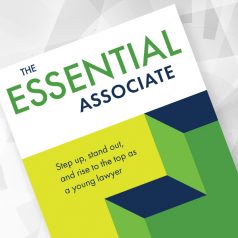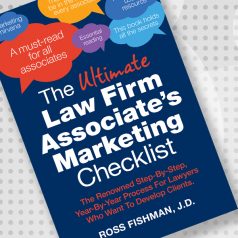Imposter syndrome. Perfectionism. Scarcity. Are self-limiting beliefs holding you back?
I didn’t have a choice. I had to bring in some clients. I had payroll to make and lights to keep on. I had just hung a shingle after a two-year hiatus from the practice of law.
Previously, I practiced at two big law firms where there was no expectation that a junior- to mid-level associate such as myself would bring in business. I had no real training. I didn’t know what to do.
I did it nonetheless, despite all kinds of self-doubt, fear and anxiety. I had to because I had nothing and no one to fall back on. And there’s the rub.
Without tremendous external pressures forcing the issue — such as the financial insecurity I faced when starting a law firm — we must rely on internal fortitude to do hard things, like picking up the phone and asking for the business. In most law firms, there is at least some expectation that lawyers will develop business. Still, many lawyers can coast along comfortably for long stretches in service of other lawyers who bring in the bulk of the work.
It’s not that lawyers aren’t disciplined enough to do hard things — just the opposite. But the hard things tend to be those subject to deadlines, like preparation for a trial date. Business development requires us to set deadlines for ourselves, and while we might set them, we’re really skilled at negotiating extensions. Next thing you know, another year passes with no real progress.
At the root of business development procrastination is that, despite our best intentions, it’s hard to rely on internal fortitude alone. That’s because our own worst critic resides inside us. It’s not some external adversary that holds us back. It’s the limiting beliefs we harbor that keep us from realizing our full potential.
Imposter Syndrome
You’ve no doubt heard the voice inside your head that tells you you’re not good enough. It makes itself heard as soon as you step out of your comfort zone — such as when you lead the trial or transaction for the first time. It’s ringing in your ears when you set out to look for new business, shouting warnings that you don’t belong, you don’t deserve it and you’re not good enough.
Perhaps worse, at the same time that voice cuts you down, it builds others up. It tells you that those around you are smarter, better and more talented — and that they have it all figured out.
If you listen to the voice, you end up staying safely within your comfort zone and stop taking risks. Your forward momentum stalls. Your confidence wanes. You start questioning your judgment. When the voice gets really loud, it engenders a paralyzing fear.
Psychologists Pauline Clance and Suzanne Imes call this type of fear “imposter syndrome.” They’ve described it as a feeling of “phoniness in people who are not intelligent, capable or creative despite evidence of high achievement.” They “live in fear of being ‘found out’ or exposed as frauds.”
There’s no way to escape imposter syndrome. After all, you can’t stop your mind from thinking negative thoughts. (Ever try?) The only way around it is straight through it. And the best way to trample it is to recognize that we are all imposters. As screenwriter William Goldman once said: “Nobody knows anything.”
If you can come to grips with the fact that those around you feel the same unease and anxiety about business development that you feel, then pushing through the uncertainty becomes easier. Instead of succumbing to self-doubt, embrace it.
Take on new challenges. Pick up the phone. Write that article. Ask for the business. Reach out to your network. Narrow your focus. Remain confident. Seek help when you need it. Learn from your mistakes. In short, get out of your head and take action.
Perfectionism
Perfectionism is a pernicious limiting belief because it sounds like a positive attribute. In certain respects, it is — but it also can be an impediment to progress.
Here’s what perfectionism sounds like in the context of business development:
“I have to edit my LinkedIn profile before I start creating content on the platform.”
“I need to do more research before I narrow the focus of my practice to a particular industry.”
“I have to work on my pitch, and then I’ll invite that prospect to lunch.”
“Once I finish my business plan, I will start taking action.”
“If I want it done right, I need to do it myself.”
You should strive for perfection in the service of clients (although it’s unattainable). But when it comes to business development, taking imperfect action must be the priority. One thing that stops lawyers from taking action is the high risk of failure in business development. You’ll lose out on far more engagements than you win.
Developing a tolerance for failure is critically important. You can’t fail if you don’t try. And even when you do fail, you’ll learn valuable lessons that will improve your efforts in the future. In this sense, failing at business development is a leading indicator of success.
The pursuit of perfection will protect you from the discomfort of business development. It’s easy to tell ourselves that we will take action “when the time is right.” But then years pass, and we’re still facing the same circumstances, despite an intense desire for change and growth. The truth is that the only time that is ever right is right now.
Scarcity
Business development requires an abundance mindset, not a scarcity mindset. Stephen Covey coined the term “abundance mindset” in his best-seller “The Seven Habits of Highly Effective People.” It describes the (abundant) belief that there are “enough resources and successes to share with others.”
Lawyers with abundance mindsets feel empowered and exhibit confidence in their business development conversations. They don’t see the game they’re playing as zero-sum.
In practical terms, what this means is:
- They bring in the right experts in their firms to help address client needs, rather than hanging on to all the work themselves.
- They share credit — in terms of results achieved and origination/compensation — with other team members.
- They develop strong professional networks and generously refer work to other lawyers when it’s not the right fit for themselves.
- They share their best ideas when creating thought leadership content, confident in the knowledge that clients won’t take those ideas and try to do it themselves. And if someone does? That’s OK — it just means it wasn’t the right client.
On the other hand, a lawyer with a scarcity mindset grips every opportunity tightly as if it’s the last one. By doing so, they miss out on the reciprocity that redounds to those who act with abundance.
Make 2021 Your Year for Business Development
Ready to take action? That business plan you’ve been working on for 2021 is great. But don’t forget to take a step back and consider whether you’re harboring limiting beliefs that may hold you back from implementing the plan in the coming year. You’re not an imposter. You don’t have to be perfect. There is great abundance to go around.
Shift your thinking. On the flip side of every limiting belief is opportunity.
Illustration ©iStockPhoto.com
Subscribe to Attorney at Work
Get really good ideas every day for your law practice: Subscribe to the Daily Dispatch (it’s free). Follow us on Twitter @attnyatwork.
RESOURCES FOR NEW LAWYERS
The Essential Associate: Step Up, Stand Out, and Rise to the Top as a Young Lawyer. From attorney, coach and legal marketing expert Jay Harrington, “The Essential Associate” is for young lawyers who aspire to grow, succeed and advance on a partnership track at a law firm. Jay’s practical, step-by-step guide is aimed at helping new lawyers thrive in today’s competitive law firm environment. It includes insights from dozens of successful lawyers at firms across the country, general counsel at Fortune 500 companies, and top consultants to the legal industry.
The Ultimate Law Firm Associate’s Marketing Checklist by Ross Fishman has been used for more than 25 years by associates in their successful quests to become rainmakers. Want to build a personally fulfilling law practice on your own terms? Ross details the tactics to accomplish your goals. Expanded and updated to include the latest online tools, plus dozens of examples, stories, case studies and videos. It is the simplest, most-effective tool to ensure associates get on — and stay on — the right track to professional success.
Get more details and order your copy here.




















